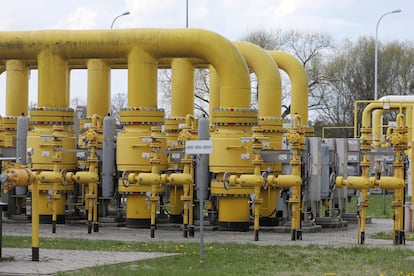Poland, Bulgaria say they have gas reserves to offset halt of Russian supply
Governments announce legal measures against Gazprom for breach of contract and assure there are plans to secure alternative sources following Moscow’s ‘blackmail’

Poland and Bulgaria say they will not be particularly affected by Russia’s decision on Wednesday to cut off its gas supply to both countries following their failure to pay in rubles. Both governments, which import 50% and 75% of their natural gas from Russia respectively, have asserted that they will not yield before Moscow’s “blackmail.”
The Polish government said the move will not affect consumers, while Bulgaria gave assurances that it has enough reserves for a month and that it is working to secure alternatives. Both countries have announced legal measures against the supplier, Russia’s state-owned Gazprom, for breach of contract.
“This is a direct attack on Poland, revenge for the sanctions imposed on Russia by our country,” said Polish Prime Minister Mateusz Morawiecki in parliament, in statements reported by Gazeta Wyborcza. “I want to assure you that this blackmail will not affect Polish households.” Morawiecki added that “starting in autumn, Poland will not need Russian gas at all.” The country has been moving to reduce its dependence on Russia for years with several projects, including one to bring in gas from Norway.
On Tuesday, the Polish government had announced new sanctions against 50 Russian individuals and companies with business interests in Poland. These measures will include the freezing of funds and assets, as well as the confiscation of their rights to shares and dividends obtained in Poland.
As for Bulgaria, the message was similar. “The government is prepared for a scenario where Gazprom stops gas supplies to our country. I want to assure the Bulgarian citizens that in no way will there be a reduction in gas supply to consumers,” said Prime Minister Kiril Petkov at the cabinet meeting on Wednesday, according to a government statement. “The Ministry of Energy has a clear action plan, including alternative sources of supply. The suspension of natural gas by Gazprom is a gross violation of the contract and blackmail for the use of an out-of-contract payment plan in rubles through third parties (...)We will not succumb to such racketeering.”
The move on Wednesday constitutes Moscow’s harshest response so far to the sanctions imposed by the West for the war in Ukraine. Russian gas continues, however, to flow to other European countries through the network of Russian gas pipelines, including the Yamal-Europe, which runs through Polish territory.
Bulgaria has asked Brussels for a common position on this measure, which the President of the European Commission, Ursula von der Leyen, has described as “unacceptable blackmail.”
The Yamal-Europe gas pipeline, which crosses Belarus and Poland, not only supplies these countries but also serves to route part of the Russian gas to other European states such as Germany. Gazprom has warned Poland and Bulgaria that they must not “illegally” extract the gas that will continue to transit through the sections of the gas pipelines that run through their territory.
Other European countries, such as Germany and Austria, have warned that they are not ready to end their dependency on Russian gas. The European Commission has called for a two-thirds cut in imports of Russian oil and gas this year.
Tu suscripción se está usando en otro dispositivo
¿Quieres añadir otro usuario a tu suscripción?
Si continúas leyendo en este dispositivo, no se podrá leer en el otro.
FlechaTu suscripción se está usando en otro dispositivo y solo puedes acceder a EL PAÍS desde un dispositivo a la vez.
Si quieres compartir tu cuenta, cambia tu suscripción a la modalidad Premium, así podrás añadir otro usuario. Cada uno accederá con su propia cuenta de email, lo que os permitirá personalizar vuestra experiencia en EL PAÍS.
¿Tienes una suscripción de empresa? Accede aquí para contratar más cuentas.
En el caso de no saber quién está usando tu cuenta, te recomendamos cambiar tu contraseña aquí.
Si decides continuar compartiendo tu cuenta, este mensaje se mostrará en tu dispositivo y en el de la otra persona que está usando tu cuenta de forma indefinida, afectando a tu experiencia de lectura. Puedes consultar aquí los términos y condiciones de la suscripción digital.








































